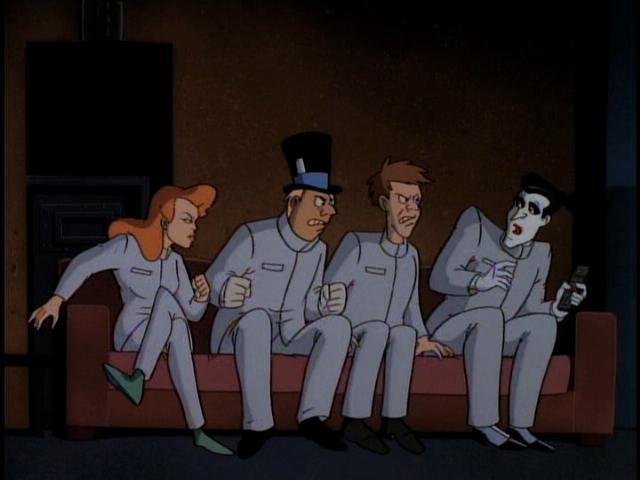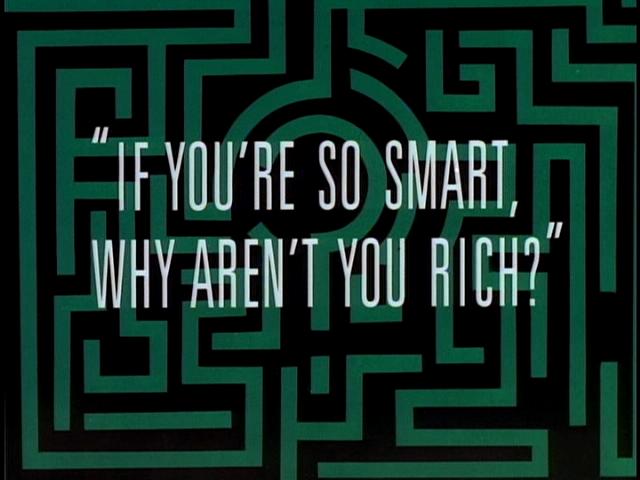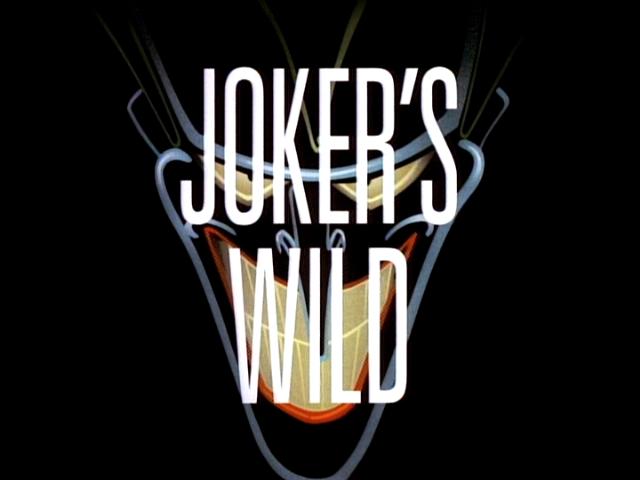“If You’re So Smart, Why Aren’t You Rich?”
Written by David Wise
Directed by Eric Radomski
Episode #039
Music Composed by Carlos Rodriguez
Animation Services by Blue Pencil, S.I.
Original Airdate – November 18th, 1992
Plot: Before he can sell his company to Wayne Enterprises, Dan Mockridge is kidnapped by former employee Edward Nygma, now calling himself The Riddler.
I fucking love the Riddler. There’s just something about the villain that prides himself on being smarter than the smartest man in the world that tickles my brain. Of course, I always love characters like the Riddler, such as Q and Mr. Mxyzptlk, villains that run our heroes through mazes for the sheer joy of watching them run. They are the closest to true writer self-insertion characters fiction has.

And my affection for the rogue is shared by the staff of Batman: The Animated Series. Series co-creator Eric Radomski steps in for his directorial debut for the villain. Reportedly, he and Bruce Timm rejected a number of scripts and voice actors for the Riddler before finding the right one, which is why Edward Nygma appears so late compared to the other established villains (for comparison, most of the other major villains have appeared twice already) after a couple of Riddler-knock offs had already appeared. But find the right script they did, and the right actor in John Glover.
John Glover’s Edward Nygma is perfect. I love Glover in pretty much everything he does and here he embodies the Riddler’s main emotion, smarmy smugness. The Riddler just isn’t the Riddler unless he’s taunting Batman and Robin over a PA system while insulting their intelligence with terrible, terrible puns. With good reason, Nygma believes that there is no one in the world as smart as he is, so he’s both delighted and annoyed when Batman sees through his mask immediately, even as he pretends not to have heard of Batman. As with the best villains, he really enjoys his work, and the angrier Batman gets the happier he is.

Even from the prologue, when he’s just an employee of Competitron, we get his character immediately. There’s a labyrinth of cubicles, but he’s not part of it. His office is to the side, and he’d rather focus on solving his crossword puzzle than actually interact with anyone else. And when Mockridge asks the rhetorical question, “if you’re so smart, why aren’t you rich?”, Nygma spends the rest of the episode answering it: when you are that smart, money doesn’t mean anything anymore.
That he truly does not care about money makes The Riddler a unique villain. Even the Joker wants to make money, even if his plans to make money are inherently flawed. But the Riddler has escaped the rat race, and moved onto a costumed world where he simply takes what he wants. He controls the power supply of Gotham. He slips in and out of Mockridge’s club. He can get Batman to run his unbelievable maze with a flying hand and deadly robot minotaurs. What does he need money for?
To further compare The Riddler to the Joker, you can see both villains rely on the hero as their audience. However, the Joker is a performer, which means he only needs Batman to see what he’s doing. The Riddler, however, is an interactive game designer, which means he needs to somehow goad Batman into taking an active role and playing along, which Batman is loathe to do. Forced into the maze to rescue Mockridge, Batman lets out a surprisingly Yiddish “Already, I love this.”
Batman and Robin are both very clever throughout the episode. They solve all of the riddles thrown at them, but explain only about half, giving the audience the impression that Batman and Robin are just smarter than you. They also trade off solving, showing that they are both smart in different ways. Robin is the one young enough to play video games, and not old enough to catch the Oklahoma reference. (Wait, Bruce has never seen It’s a Wonderful Life, but he’s familiar with Rogers and Hammerstein?) And it’s Robin who takes out the Riddler’s thugs, even if it’s Batman who has to save Robin after the Riddler gets the drop on them. Again, it’s good to see Batman asking for, getting, and accepting help from someone else.
In the end, Batman saves Mockridge by intentionally getting caught, then hacking the game. Because you can’t beat the Riddler by playing along. You can only win by refusing to play. (I do wish, however, Batman had to give up his wrist computer as well as his utility belt to enter the maze. He’d be much more impressive if he didn’t look up half the answers on Encyclopedia Bat-anica, or, perhaps, Wayne-kipedia).
Importantly, the Riddler is the first Batman villain with a Revenge Origin story who flat out wins. Sure, Clock King and Clayface escape, and Mr. Freeze and Two-Face achieve part of their revenges, but the Riddler gets everything he wants AND gets away. He breaks Mockridge’s mind, so much that Mockridge goes to bed clutching a shotgun, and he got Batman and Robin to run his maze. Yes, as Robin says, Mockridge survives, but as Batman points out, the Riddler has disappeared for months but could take Mockridge at any time. The Riddler doesn’t want Mockridge’s money or his life, he wants Mockridge’s mind.
It’s a little weird that Batman delivers the bon mot “How much is a good night’s sleep worth? Now there’s a riddle for you,” like an EC Comics narrator, as it implies Batman thinks the Riddler was justified in taking his revenge on Mockridge. Batman didn’t agree with Mr. Freeze, Two-Face, or Clayface, and they were attacking murderers. The Riddler was simply, and legally, screwed out of a deal by a bad work-for-hire contract. Was this David Wise and the other writers taking a jab at DC Comics, which has a terrible history of undervaluing their creators?

Another weird note is that the video game that Edward Nygma created does not look very good. The graphics are only slightly better than Adventure for the Atari 2600, in a world of mindreading devices and human-duplicate androids, and no one has ever beaten it. How in the world did this game sell enough copies to inspire an entire theme park? (Also, the Batcomputer costs $50 million, but the deal with Mockridge brings in only 5 million a year to Gotham. Shouldn’t Batman sell the batcomputer, buy an Apple IIe, and donate the profits to the city?)
“Joker’s Wild”
Written by Paul Dini
Directed by Boyd Kirkland
Episode #040
Music Composed by Todd Hayen
Animation Services by Akom Production Co.
Original Airdate – November 19th 1992
Plot: Casino Mogul Cameron Kaiser’s new casino is named after the Joker, enraging the Clown Prince of Crime. But Kaiser is running an insurance scam and wants the Joker to blow up his casino.
“Joker’s Wild” is an episode I liked as a kid, and love as an adult, because it’s only now that I get that Harry Hamlin plays Cameron Kaiser as a not-even-thinly-veiled jab at Donald Trump, whose Taj Mahal casino had declared bankruptcy in 1991. Apparently Paul Dini thought Trump would make a great Batman villain. He already as the punning last name, outsized ego, dark reflection of Bruce Wayne lifestyle, and it’s not beyond belief that Trump would run a Producers-style scam involving the death of thousands and the likeness of the world’s most famous homicidal maniac.

Boyd Kirkland does a great job with the reaction shots at the unveiling, showing just how horrible a Joker-themed casino is in the world of Batman. It would be like Trump opening a Manson-themed casino, or an Osama bin Ladin casino. Sickening, grotesque. Just emotionally devastating. Trump Kaiser tries to pass it off as a coincidence, as jokers have been on playing cards long before the villain ever existed, but it’s harder to believe that when your logo looks exactly like the Joker, AND you’ve dressed your waitresses as the Joker’s girlfriend, AND, of course, you have the Joker’s actual car gassed up and ready to go in your lobby. Which would be like keeping a working Panzer Tank in the middle of your “German Heritage” theme park.
Kaiser has a little bit of cover because, obviously, this Joker is literally a cartoon character, so his face naturally translates into a logo. It would be harder to argue coincidence if it was recognizably Jack Nicholson’s or Heath Ledger’s giant mechanical head laughing at the tourists. Furthermore, even within the context of a cartoon, the Joker is a cartoon character. In this episode alone, and in a bit of corporate synergy, the Joker whistles the Merry Melodies theme and keeps switching the TV to Looney Tunes. Clearly, the Joker thinks of himself as Bugs Bunny to Batman’s humorless Elmer Fudd.

Of course, Kaiser’s homage to the Joker is completely intentional, in order to goad the Joker into blowing up the casino. In his eighth appearance, this is the first episode in which the Joker is the protagonist, and when seen outside the fearful perspective of Batman or the Joker’s victims, it turns out the Joker is kind of an idiot. Until Batman points it out, he never questions why someone would build a casino to honor him or why it was so easy to escape from Arkham (we the audience can infer the guard, played by Ghostbusters Ernie Hudson in a cameo, was paid off by Kaiser). Even then, his plan to kill Kaiser and take over the casino makes no sense at all. Once again, the Joker is interested in making money, he just has no idea how to actually do it.
Batman’s relationship with the Joker has progressed to a weird point of familiarity here. He’s still trying to stop the Joker and save lives, but he’s no longer angry at him. He plays Blackjack with the Joker (they both cheat, Bruce cheats better), he carefully explains the plot to the Joker. He doesn’t even really yell. Batman saves his anger for Kaiser, the quote unquote sane man who tries to make millions off of the deaths of others. By now, Batman treats the Joker like a wild animal, one you can’t get mad at for attacking people, because it’s just in its nature.
The episode also progresses the nature of the Arkham inmates. Rather than the random collection of idiots in “Christmas with the Joker,” the Arkham Rec Room is now populated by the familiar (if off-model) faces of Poison Ivy, the Mad Hatter, and the Scarecrow. And where the Penguin and Two-Face treated the Joker as an equal in “The Strange Secret of Bruce Wayne,” it’s clear here that these inmates do not like or respect the Joker, especially Poison Ivy. We see the Joker using the same flirt/threat routine on her that he uses on poor Harley Quinn, but Pamela Isley is having none of it. She never backs down, never finds him cute, or even scary, and looks like she’s about to shove a cactus up his butt the moment the guards look away. Here we see the start of the animosity that will come to a head in “Harley and Ivy.”

Steven Padnick is a freelance writer and editor. By day. You can find more of his writing and funny pictures at padnick.tumblr.com.












I like the character of the TAS Riddler. Everything about him as an individual works great — the look evoking Fred Astaire, the original inspiration for the comics character’s design; the costume which is a variant on the classy suit Frank Gorshin’s Riddler wore in the ’66 movie; and of course the debonair menace of John Glover’s voice. Unfortunately, most of the episodes we got about the Riddler pretty much sucked. The thing that should define a good Riddler story is good riddles and brain teasers, but the only B:TAS Riddler episode that gave us anything of the sort was “Riddler’s Reform.” The riddles here and in “What Is Reality?” are quite lame and barely even qualify as riddles; and in an ill-considered attempt to update the character, they replaced clever mind games and stratagems with computer-oriented plotlines that essentially turned Batman into a video-game character. Not to mention that both episodes were saddled with mediocre animation and, as you say, pretty abysmal representations of these supposedly sophisticated computer games and VR simulations.
As for “Joker’s Wild,” it has its entertaining moments, particularly in the Arkham scenes, but it feels kind of ordinary in comparison to most of Dini’s other Joker episodes.
I seriously doubt that Dini and Company gave a flying fuck about the treatment of writers at DC Comics as they worked for Warner Brothers which, by all accounts, treated everyone wonderfully.
It’s interesting how few individuals realize how little DC Comics matters to a vast corporation like Warners in all its incarnations as only the characters as film properties, animated and live, make any amount of meaningful revenues.
When I was a kid, Riddler was my favourite Batman villain – besides Joker – thanks to the BTAS episodes. Now, as an adoult, Riddler is still my favourite Batman villain… and sometimes I feel that he is underappreciated, just because he is not a cold-blooded killer (suddenly a Neil Gaiman comic book story came to my mind, reprinted in the Whatever Happened With The Caped Crusader HC). But he is funny, witty and intelligent, so how can one not love him?
Also, has anybody recognized, that Jimmy Carrey’s character was Riddler in name only? Okay, okay, there were riddles, but otherwise his goal and means was that of Mad Hatter.
@3: Carrey’s Riddler was closer to the Joker in personality, though yes, his scheme was very Mad Hatter-ish. I think making Carrey’s Riddler a goofy lunatic was missing the point. A joke is just about laughter, but a riddle is a brainteaser, a challenge for the mind. That should be the difference between the characters: the Joker is the madcap, twisted clown out to play a sick, sadistic joke on the world, but the Riddler is the mastermind confounding the good guys with his puzzles and stratagems.
I loved the Riddler episodes when I was younger. In 1992 I was 9, so the fact that here was an episode combining my two loves, Batman and video games, was a mind-blowing proposition. I wouldn’t have the fondness I have for The Riddler today if it wasn’t for TAS.
@3: It’s true he’s underappreciated. Of all the top Batman story arcs, I think the only one he has a significant role in is Hush, and even then he’s not the main focus of the story. Luckily he’s given some importance in the Arkham games, and he’ll definitely his due once Scott Snyder gets his hands on him (which he intends to do judging by his interviews).
4: Peter David, in the Batman Foreve novelization, did a pretty good job fixing the Jim Carrey Riddlern(and TLJ Two Face) as I Recall